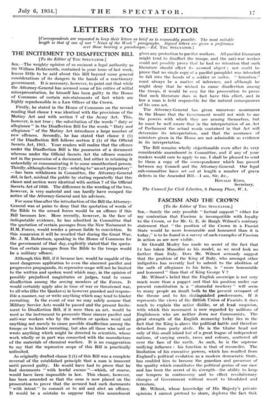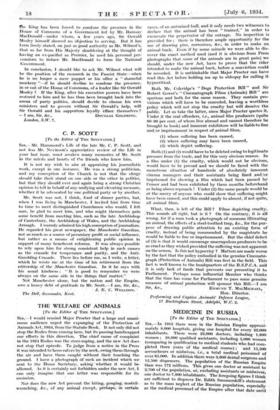FASCISM AND THE CROWN
[To the Editor of THE SPECTATOR.]
Sin,—Surely the only possible " factual support " either for my contention that. Fascism is incompatible with loyalty to the Crown, or for Mr. G. E. de Burgh Wilmot's contrary statement that " the position of the Crown in a Fascist State would be more honourable and honoured than it is today," is to be found in a survey of such examples of Fascism in action as are now visible.
Sir Oswald Mosley has made no secret of the fact that Le has taken Mussolini as his model, so we need look no further than Italy. Does Mr. Wilmot seriously suggest that the position of the King of Italy, who amongst other indignities has recently had to submit to the abolition of the oath of allegiance to his heirs, is " more honourable and honoured " than that of King George V ?
Mr. Wilmot's belief that the English sovereign is not very much more than a puppet and that his position under our present constitution is a " shameful mockery " will seem to many people an insult both to the present occupant of the throne and to his distinguished predecessors. If it represents the views of the British Union of Fascists it does much to explain the active dislike, or at least suspicion, with which this movement is now regarded by millions of Englishmen who are neither Jews nor Communists. The great strength of the English monarchy today lies in the fact that the King is above the political battle and therefore detached from party strife. He is the titular head not only of this small island but of a great league of independent nations, of varying creeds, races and colours, scattered all over the face of the earth. As such, he is the supreme unifying influence : his function is that of reconciler. The
limitation of his executive powers, which has resulted from England's political evolution as a modern democratic State, has enabled him to become the guardian and preserver of the quality which constitutes the political genius of our race and has been the secret of its strength—the ability to keep our tempers in controversy and to effect revolutionary changes of Government without resort to bloodshed and terrorism.
Mr. Wilmot, whose knowledge of His Majesty's private opinions I cannot pretend to share, deplores the fact that
the King has been forced to condone the presence in the House of Commons of a Goyernment led by Mr. Ramsay MacDonald—under whom, a few years ago, Sir Oswald Mosley himself showed no 'objection to serving. But it has been freely stated, on just as good authority as Mr. Wilmot's, that so far from His Majesty shuddering at the thought of having an ex-pacifist as Premier, he used his personal per- suasions to induce Mr. MacDonald to form the National Government.
In conclusion, I should like to ask Mr. Wilmot what will be the position of the monarch in the Fascist State—when he is no longer a mere puppet or his office a " shameful mockery "—if he should decline to condone the presence, in or out of the House of Commons, of a leader like Sir Oswald Mosley - If the King, after his executive powers have been restored to him and he has thus been brought back into the arena of party politics, should decide to choose his own ministers and to govern without Sir Oswald's help, will Sir Oswald and his supporters loyally efface themselves ?











































 Previous page
Previous page